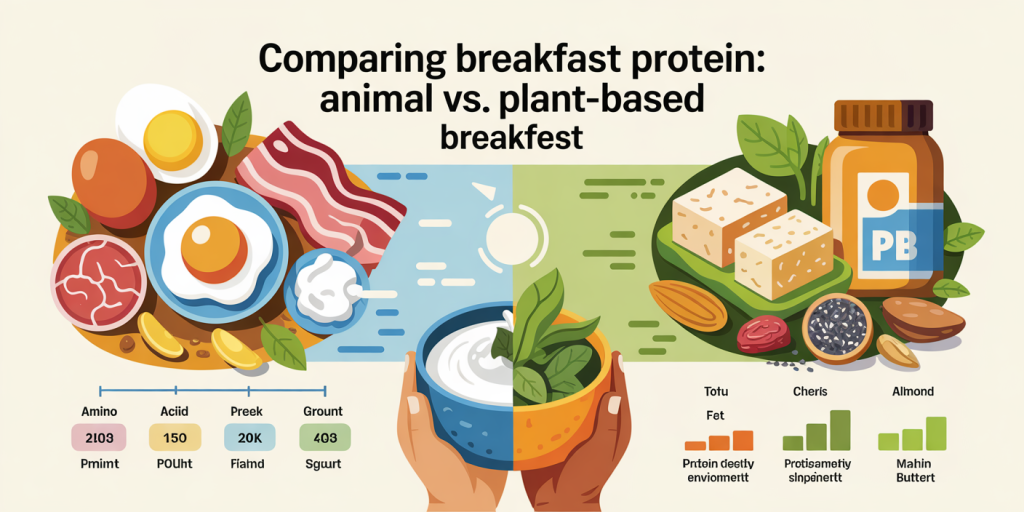Starting the day with a high-protein breakfast has become an increasingly popular choice for individuals aiming to enhance energy levels, support muscle growth, and improve overall health. Protein-rich meals in the morning not only help regulate appetite and reduce cravings but also promote sustained cognitive function throughout the day. This article explores the benefits of high-protein breakfasts, practical recipe ideas, and their comparative nutritional values, backed by recent scientific insights.
The Significance of Protein in Morning Nutrition
Protein is a fundamental macronutrient crucial for numerous bodily functions, including muscle repair, enzyme production, and hormone balance. Consuming a protein-dense breakfast helps stabilize blood sugar levels by slowing carbohydrate absorption, which can prevent mid-morning energy crashes. A study published in *Appetite* (2015) found that individuals consuming at least 30 grams of protein at breakfast experienced a 12% reduction in daily calorie intake compared to those consuming low-protein breakfasts, supporting weight management goals.
Moreover, the thermic effect of protein—the energy expended to metabolize food—is higher than that of fats or carbohydrates, meaning protein-rich meals can slightly boost metabolism. For athletes and fitness enthusiasts, morning protein is vital for muscle protein synthesis after overnight fasting, enhancing recovery and performance.
In practical terms, integrating high-quality protein sources into breakfast can be simple and adaptable to various dietary preferences, from animal-based proteins like eggs and dairy to plant-based sources such as legumes and nuts.
Popular High-Protein Breakfast Options and Their Nutritional Profiles
Eggs remain one of the most versatile and nutrient-rich protein sources suitable for breakfast. One large egg contains approximately 6 grams of high biological value protein, with all nine essential amino acids. For example, a classic omelet made with three eggs, spinach, and mushrooms provides nearly 18 grams of protein, along with vital micronutrients like choline and vitamin D.
Greek yogurt is another breakfast staple favored for its high protein content; a typical 6-ounce serving contains around 15 grams of protein, double that found in regular yogurt. Combining Greek yogurt with nuts and berries adds fiber, healthy fats, and antioxidants, creating a balanced and satiating meal.
Plant-based eaters can turn to oatmeal with protein powder or add chia seeds and almond butter to elevate their breakfast protein content. For instance, half a cup of dry oats contains about 5 grams of protein; adding 20 grams of whey or pea protein powder and a tablespoon of chia seeds can boost the total to over 25 grams.
To illustrate these options, the following table compares the protein content and other macronutrients from common breakfast foods:
| Breakfast Option | Protein (grams) | Carbohydrates (grams) | Fat (grams) | Calories |
|---|---|---|---|---|
| 3 Egg Omelet with Vegetables | 18 | 5 | 15 | 250 |
| 6 oz Greek Yogurt with Berries | 15 | 20 | 4 | 180 |
| Oatmeal with Protein Powder | 25 | 30 | 10 | 350 |
| Peanut Butter Toast (2 slices) | 14 | 22 | 16 | 300 |
| Tofu Scramble (150g Tofu) | 19 | 6 | 9 | 220 |
This table highlights how different breakfast meals can be tailored to meet protein goals while balancing other macronutrients based on personal needs.

Practical High-Protein Breakfast Recipes to Try
Committing to eating a protein-packed breakfast can be made effortless with these easy and tasty recipes:
1. Veggie-Packed Egg Muffins Whisk six large eggs with diced bell peppers, onions, spinach, and a sprinkle of low-fat cheese. Pour the mixture into a muffin tin and bake at 350°F for 20 minutes. Each muffin contains approximately 8 grams of protein and can be prepared in advance, ideal for busy mornings.
2. Protein-Enhanced Smoothie Bowl Blend one scoop of whey or plant-based protein powder with unsweetened almond milk, frozen berries, half a banana, and a tablespoon of flaxseeds. Top with granola and nuts for added texture and protein. This smoothie delivers about 30 grams of protein and provides antioxidants and fiber.
3. Cottage Cheese and Fruit Parfait Combine 1 cup of low-fat cottage cheese (28 grams protein) with sliced peaches or pineapple and a dash of cinnamon. This dish offers an excellent balance of high protein, vitamins, and refreshing flavor, perfect for those seeking a quick and nutritious breakfast.
4. Lentil and Quinoa Breakfast Bowl Cook ½ cup of red lentils with ½ cup of quinoa, then season with turmeric, cumin, and black pepper. Top with avocado slices and a poached egg for a plant-forward yet protein-dense meal, providing close to 30 grams of protein and complex carbohydrates.
All these recipes demonstrate versatility and simplicity, making it easier to incorporate protein into daily breakfasts regardless of dietary restrictions or time constraints.
Scientific Support and Real-World Outcomes
A growing body of research underscores the advantages of consuming protein-rich breakfasts beyond mere muscle building. For instance, a randomized controlled trial in *The American Journal of Clinical Nutrition* (2016) revealed that overweight individuals who ate a high-protein breakfast (35 grams) experienced greater reductions in hunger and better blood sugar control than those who consumed lower-protein meals.
In practice, professional athletes and fitness models often prioritize protein in their first meal. Bodybuilder Dorian Yates, for example, famously began his mornings with multiple eggs and lean meat to fuel intense training sessions. Similarly, dietitians frequently recommend high-protein breakfasts to patients managing type 2 diabetes or metabolic syndrome to aid in glucose regulation.
One real-world case comes from a 45-year-old woman diagnosed with prediabetes who incorporated a high-protein breakfast regimen with eggs, Greek yogurt, and nuts. Over six months, she reported improved satiety, stable blood glucose readings, and weight loss, demonstrating the practical benefits of such dietary changes.
Comparing High-Protein Breakfasts: Animal vs. Plant Sources
Many people wonder whether animal or plant proteins are more beneficial for breakfast consumption. Both types present distinct advantages, and understanding these is key to optimizing dietary choices.
Animal proteins, found in eggs, dairy, and meat, are complete proteins, supplying all essential amino acids necessary for muscle synthesis and recovery. They typically offer higher protein per serving and are more readily absorbed by the body. However, some animal sources may contain saturated fat and cholesterol, which should be moderated as per individual health profiles.
Plant proteins, such as legumes, grains, nuts, and seeds, offer fiber, antioxidants, and unsaturated fats, contributing to cardiovascular health. While many plant proteins are incomplete individually (missing one or more essential amino acids), combining different sources—like grains and legumes—can provide complete protein profiles. Moreover, plant-based breakfasts tend to be lower in calories and saturated fats, making them suitable for weight management and chronic disease prevention.
The table below outlines key differences:
| Feature | Animal Protein | Plant Protein |
|---|---|---|
| Amino Acid Profile | Complete (all essential amino acids) | Often incomplete individually |
| Protein Density | Higher per serving | Variable, often lower per serving |
| Saturated Fat Content | May be high in some sources | Generally lower |
| Additional Benefits | Vitamin B12, Heme Iron | Fiber, antioxidants, unsaturated fats |
| Environmental Impact | Higher carbon footprint | Lower environmental impact |
Choosing between these depends on dietary preferences, ethical considerations, and health conditions. Many nutritionists advocate for a mixed approach to obtain broad nutritional benefits.

Future Perspectives: Innovations in High-Protein Breakfasts
As dietary trends evolve, the future of high-protein breakfasts is shaped by innovations in food technology, sustainability, and personalized nutrition. The rising popularity of plant-based proteins has driven advances in producing meat substitutes and protein-enriched products from algae, insects, and cultured proteins.

For example, novel ingredients like mycoprotein (derived from fungi) are gaining traction due to their high protein content, low environmental footprint, and suitability in versatile recipes. Startups are developing ready-made, nutrient-formulated breakfast bowls and bars that incorporate diverse protein sources tailored to different lifestyles and health goals.
Personalized nutrition apps and AI-driven meal planning tools now enable consumers to optimize their breakfast protein intake based on genetic profiles, activity levels, and metabolic responses. This trend toward customization promises higher adherence, better health outcomes, and smarter food choices.
Moreover, increasing public awareness of the link between morning nutrition and mental focus stimulates research into how protein-rich breakfasts influence neurotransmitter activity, mood, and productivity.
In summary, the future holds exciting possibilities for high-protein breakfast options, merging health science with convenience and sustainability to empower consumers toward more energizing and balanced mornings.
—
By prioritizing high-protein breakfast choices through simple recipes, informed food selection, and emerging dietary innovations, individuals can effectively improve physical performance, manage weight, and enhance overall well-being.

Deixe um comentário